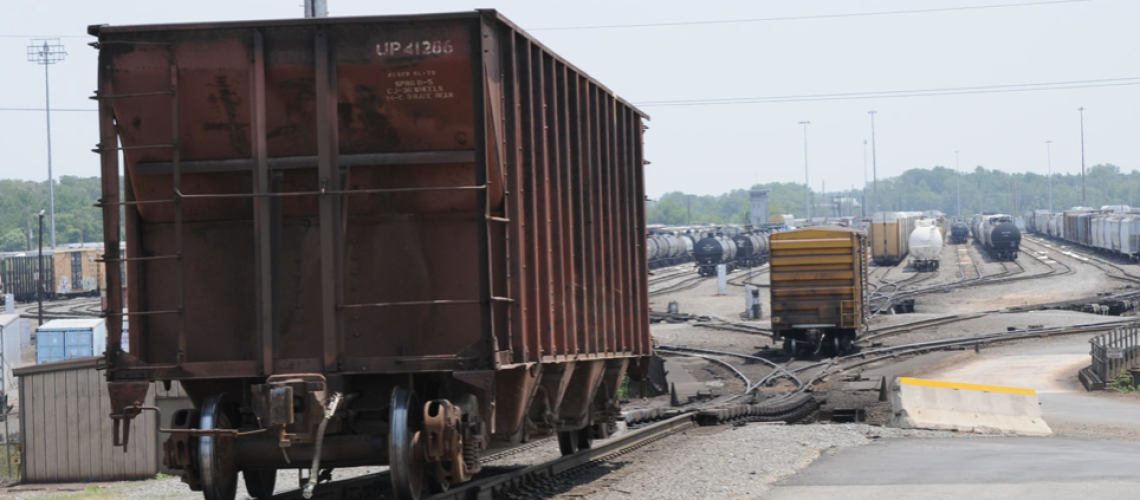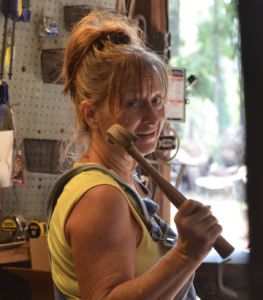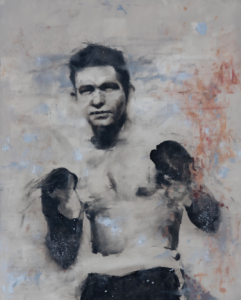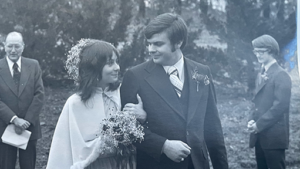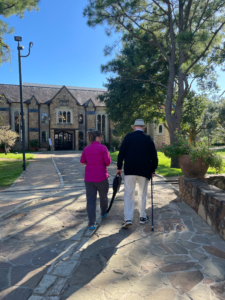Wiping the fine mist of my breath from the window, I look up into the dark sky. It’s beautiful. The moon is full, bounded by roiling gray-black clouds and I am reminded of a poem Dad read to me once. It was about a highwayman who was in love with a maid named Bess, the poetic imagery so strong that I am certain Noye had such a night as this in mind when he penned the tragedy. I would like to share my father’s love of words, perhaps the man as well, with my boys but they haven’t arrived yet. When they do, this reflective moment most likely will be lost or I will find them unreceptive. Curious that I should think of Dad and what an odd place to reminisce! Along with several other parents in interrupted sleep cycles, I sit waiting for the activity bus in a parking lot on Ella, only a couple miles west of the interstate. Houston is a big city and a long ways away from Dad and my hometown in Arkansas. Longer in ways more than distance.
The sounds of the day, buses, trucks, ambulance sirens, airplanes, are silent and the city is asleep. It’s 2 a.m., the soft green glow from my bug -butt green watch the boys gave me an unobtrusive reminder of time passing. The car is stuffy and quiet and rolling the window down I hear something familiar. More accurately, I feel the sound, like the way you sometimes feel the beat of a drum or the explosive clap of thunder, only more subtle. It is coming across the wind, from a distance, blown in and out by the gusts of air, but I know exactly what I am hearing. The distant rumbling is the sound of power that is distinct to diesel engines, several of them in tandem. The plaintive whistle, as the locomotives come to a crossing, surprises me. In it’s isolation , the sound is poignant, producing a well spring of memories. I was a switchman’s daughter.
The switch yard was about six miles from our house. It was Dad’s place of work and more than its close proximity, our life was dictated to by the demands of a railroader’s life. We lived upside down, Dad working midnights at first because it was all his seniority would allow and later because it was all he knew. Mother made “lunches” to be eaten at 2 a.m. and I religiously watched the 10 o’clock news for the most up to date weather, learning that for an outdoor laborer, a winter wind is almost as important as temperature. We learned to play quietly in the day or in the defiance make my mother’s life miserable. When I look back, she was sorely put upon. It was her duty to get Dad up on time, reluctantly obeying his demands of “just five more minutes”. This was the most active part of the day for us, as she worried over a husband who had drank too much, didn’t eat enough, and children, who searched for a switch lantern and the railroad watch, when they should be in bed. The culmination came as Dad headed out the door, the sudden cessation of activity a little like a party ended too soon. Getting to sleep was difficult. It set the pattern for insomnia for me.
I kept my bed by the window. It was a necessity to catch the sucking, inward breeze generated by the window fan in the living room in the summer; in the winter it was just habit. There was something reassuring about the sounds coming from the train yard. I could hear the switch engines as the crews began the night’s work, the soft rumble of leashed power and the controlled collision that coupled a car. There were rock trains and cars full of mined bauxite, hundreds of thousands of tons being pulled by engines whose only evidence of strain, a slightly different pitched, muffled roar. A “hump” yard was constructed in my teen years. The switch engine would push trains over the 30 degree incline while the humpmaster assigned each car, electronically pulling a switch to the anastomosing tracks below the hill, each filling with cars headed for common destinations. The best crew was the engineer, switchman, and humpmaster who found the right mix of speed up the incline as the uncoupled car left with nothing to power it but Newtonian forces, descending the hill. I knew by the deep throated rumble when the hump was moving too fast. On very still nights, I could hear the large diesel engines at idle, never stopped, steady and hardy like the human heart. Through my window, borne on 21 years of nights, the sounds of the railroad became my unconscious lullaby.
In Arkansas working for the railroad was one of the few ways a laborer could make a decent living. Nepotism was just another form of recommendation then, so Jack, Sr. got Dad the job. I guess it could have been his mother, a highly educated, high school graduate and a railroad clerk, but I doubt it. Ovea was feisty and more than a little mean to everyone but me. I loved to visit the cavernous depot where she worked, she smartly strutting around on high heels, a smoking cigarette in the ashtray, typing away on her big, bulky Underwood. The depot was the only place outside of church that I knew used pews to seat people and I thought their use irreverent and confusing. The place smelled oily, with people carrying hard, square suitcases hurrying, dwarfed by tall ceilings and caressed by the rumble and feel of the diesels.
Long before there were take your daughter to work days, prompted by thoughts Dad had that he never shared, I would go with him to work. His demeanor during these times suggested to me that what we were doing was not sanctioned by the railroad. These opportunities always took advantage of Dad’s midnight schedule and the older I got, the more elaborate my work attire, (read disguise) became. The last time I remember going I was about 17. My hair was stuffed under a workman’s cap and I wore pleated workpants a few sizes too large, a switch lantern at my side. “Try not to carry it like a purse,” he said.
Dad’s job and his attitude towards it were a study in contrasts. He hated being a laborer, doing the foreman’s bidding in heat and cold but he respected railroading, saw wonder in the conception and power of the diesel engine. Railroading was in a sense humbling. He loved trains and what they were capable of doing. They changed the face of our nation. In me this love was distilled into the sounds of the railroad and the spirit of the railroad man’s job well done. I am thinking I should share this with my boys.
Blinking lights, downshifting, the bus pulls up. The parking lot is full of activity and my railroad song is obscured. The opportunity to share poetry or history or revelation has passed. My boys are always the last off. John is the first to come to the door.
“Mom, you sleeping? We’re really late. Sorry.”
“What did you do while you waited for us?”
When the time is right, I will tell them. They will know that railroading has changed. You used to buy an airmail stamp if you didn’t want your mail routed in mailcars, there are no more cabooses, and only only a handful of huge conglomerates remain of the 13 Class I railroads of my time. Yet rail still remains the cheapest way to transport heavy materials. I will tell them how I met their father clerking for the railroad on weekends and that he can look at a railroad car number and without looking at the car tell you whether it’s a gondola, tanker, flatbed, or autorack. They should know that their grandfather would have admired him. I will remind them that their Uncle Neil has not only let them fly planes but when they were young, placed their hands on the throttle of a switch engine, sharing our legacy. I will explain that we hardly ever sit at a railroad crossing because loops and beltways around the city and intersecting freeways bypass the railroads, making it easier to keep the pace of our harried city life but we will take the time to find a country road and wait at a crossing. As the railcars pass by, I will explain that welded rail changed the clacking of steel on steel but not the uneven thud of a wheel with a flat spot. I’ll tell them about the old diner, the metal kind with leather booths and stools sitting amid the kudzu and mustang grapes where Hardy road crosses FM 1960 that I discovered while foraging. Sitting on the main line to Dallas, I’m sure they offered hot coffee and blueplate specials to switchman and brakeman fifty years ago, it will make a nice story. I will tell them that in cities, people are offended by noises and insist that earth berms be erected around the rail yards so the noise will not escape. Then I will sing them a lullaby of how railroads shaped a nation …and me.

